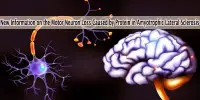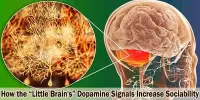Researchers have figured out why about half of people on popular antidepressants experience emotional “blunting.” They demonstrate how the medications impact reinforcement learning, a crucial behavioral process that enables us to learn from our surroundings, in a study that was just published today (January 22, 2023).
According to the NHS, more than 8.3 million patients in England received an antidepressant drug in 2021/22. Selective serotonin reuptake inhibitors (SSRIs) are a family of antidepressants that are frequently used, especially for persistent or severe instances. These medications target serotonin, known as the “pleasure chemical” because it transmits messages between brain cells.
Patients who take SSRIs frequently report experiencing “blunting,” in which they feel emotionally flat and no longer find life as enjoyable as they once did. Between 40-60% of patients taking SSRIs are believed to experience this side effect.
Most SSRI studies to date have only looked at their short-term usage; however, these medications are taken persistently, over a longer length of time, for clinical use in depression. A team led by researchers at the University of Cambridge, in collaboration with the University of Copenhagen, sought to address this by recruiting healthy volunteers and administering escitalopram, an SSRI known to be one of the best-tolerated, over several weeks and assessing the impact the drug had on their performance on a suite of cognitive tests.
Emotional blunting is a common side effect of SSRI antidepressants. In a way, this may be in part how they work they take away some of the emotional pain that people who experience depression feel, but, unfortunately, it seems that they also take away some of the enjoyment. From our study, we can now see that this is because they become less sensitive to rewards, which provide important feedback.
Professor Barbara Sahakian
In total, 66 volunteers took part in the experiment, 32 of whom were given escitalopram while the other 34 were given a placebo. Participants completed a thorough set of self-report questionnaires, took the medication or a placebo for at least 21 days, and underwent a battery of tests to gauge their cognitive abilities, including learning, inhibition, executive function, reinforcing behavior, and decision-making.
The results of the study are published today in Neuropsychopharmacology.
When it comes to ‘cold’ cognition, such as attention and memory, the research team discovered no significant group differences. Most tests of ‘hot cognition,’ or cognitive processes involving our emotions, showed no differences.
The main novel discovery, however, was that the escitalopram group performed two tasks with less reinforcement sensitivity than the placebo group did. Reinforcement learning is how we learn from feedback from our actions and environment.
In order to assess reinforcement sensitivity, the researchers used a ‘probabilistic reversal test’. In this task, a participant would typically be shown two stimuli, A and B. If they chose A, then four out of five times, they would receive a reward; if they chose B, they would only receive a reward one time out of five.
At some time throughout the experiment, the probabilities would change, and volunteers would need to learn a new rule. They would not be informed this rule; instead, they would have to figure it out for themselves.
Researchers discovered that escitalopram users were less likely than placebo users to use positive and negative feedback to direct their task learning. This indicates that the medicine may have interfered with their capacity to perceive rewards and to behave appropriately.
The discovery may also help to explain the team’s only difference in the self-reported questionnaires: volunteers using escitalopram had more difficulty achieving orgasm during sexual activity, a side effect frequently mentioned by patients.
Professor Barbara Sahakian, senior author, from the Department of Psychiatry at the University of Cambridge and a Fellow at Clare Hall, said: “Emotional blunting is a common side effect of SSRI antidepressants. In a way, this may be in part how they work they take away some of the emotional pain that people who experience depression feel, but, unfortunately, it seems that they also take away some of the enjoyment. From our study, we can now see that this is because they become less sensitive to rewards, which provide important feedback.”
Dr. Christelle Langley, joint first author also from the Department of Psychiatry, added: “Our findings provide important evidence for the role of serotonin in reinforcement learning. We are following this work up with a study examining neuroimaging data to understand how escitalopram affects the brain during reward learning.”
The research was funded by the Lundbeck Foundation.
















